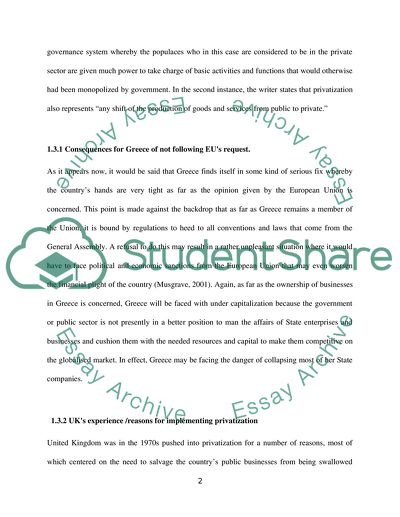Cite this document
(“The EU has stipulated that in order to receive financial support Essay”, n.d.)
The EU has stipulated that in order to receive financial support Essay. Retrieved from https://studentshare.org/macro-microeconomics/1601160-the-eu-has-stipulated-that-in-order-to-receive-financial-support-greece-must-privatise-public-assets-advise-greece-on-the-experiences-of-the-uks-privatisation-programme-and-how-they-can-avoid-the-errors-of-the-uks-experience
The EU has stipulated that in order to receive financial support Essay. Retrieved from https://studentshare.org/macro-microeconomics/1601160-the-eu-has-stipulated-that-in-order-to-receive-financial-support-greece-must-privatise-public-assets-advise-greece-on-the-experiences-of-the-uks-privatisation-programme-and-how-they-can-avoid-the-errors-of-the-uks-experience
(The EU Has Stipulated That in Order to Receive Financial Support Essay)
The EU Has Stipulated That in Order to Receive Financial Support Essay. https://studentshare.org/macro-microeconomics/1601160-the-eu-has-stipulated-that-in-order-to-receive-financial-support-greece-must-privatise-public-assets-advise-greece-on-the-experiences-of-the-uks-privatisation-programme-and-how-they-can-avoid-the-errors-of-the-uks-experience.
The EU Has Stipulated That in Order to Receive Financial Support Essay. https://studentshare.org/macro-microeconomics/1601160-the-eu-has-stipulated-that-in-order-to-receive-financial-support-greece-must-privatise-public-assets-advise-greece-on-the-experiences-of-the-uks-privatisation-programme-and-how-they-can-avoid-the-errors-of-the-uks-experience.
“The EU Has Stipulated That in Order to Receive Financial Support Essay”, n.d. https://studentshare.org/macro-microeconomics/1601160-the-eu-has-stipulated-that-in-order-to-receive-financial-support-greece-must-privatise-public-assets-advise-greece-on-the-experiences-of-the-uks-privatisation-programme-and-how-they-can-avoid-the-errors-of-the-uks-experience.


